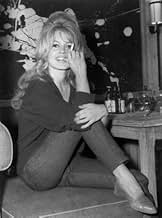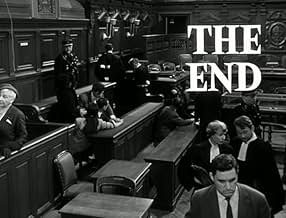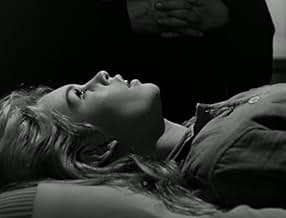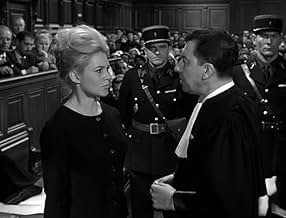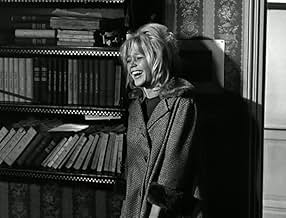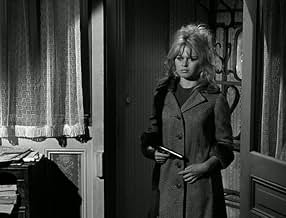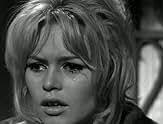VALUTAZIONE IMDb
7,6/10
4964
LA TUA VALUTAZIONE
Segue la giovane ragazza libera e ferita che ha sfidato la Francia ipocrita.Segue la giovane ragazza libera e ferita che ha sfidato la Francia ipocrita.Segue la giovane ragazza libera e ferita che ha sfidato la Francia ipocrita.
- Regia
- Sceneggiatura
- Star
- Candidato a 1 Oscar
- 3 vittorie e 2 candidature totali
Barbara Sommers
- Daisy
- (as Barbara Sohmers)
Recensioni in evidenza
If "Rashomon" blew your mind, "La vérité" will blow your heart. In 1950, Japanese director Akira Kurosawa blew our minds with his unforgettable "Rashomon", a murder mystery that exposed the chimerical nature of truth as it is perverted by the flawed perception of each observer. We visualized the events surrounding a murder, via the conflicting testimonies of witnesses in court, never being told what's truth and what is not. Here in 1960 French director Henri-Georges Clouzot hits us with "La vérité", a murder mystery similarly visualized via testimonies in a courtroom drama, but in this case the facts are not disputed. In this case what's being subjectively perverted is the emotion behind the crime.
Brigitte Bardot is a young girl on trial for the murder of her lover. The prosecution perceives her as a cold-hearted, calculating killer. The defense sees her as a heartbroken, confused young girl pushed to a desperate act. What we get is a suspenseful peeling of the truth, but not the truth in terms of facts. We get to the root of the truth in terms of feelings. I imagine if you were to hook electrodes to your brain and study which areas light up when watching these films, "Rashomon" would light up your frontal lobe (logic center) while "La vérité" would light up that tiny peanut at the core of your head, the amygdala (emotional center).
The point being made, and unforgettably expressed in a passionate monologue by Ms. Bardot, is that hard facts aren't the only component of truth. She roars: "You sit up there, in your ridiculous robes, and you want to judge but you have never lived! Never loved! You hate me because you are dead! Dead!"
I challenge anyone to watch that scene and tell me that Brigitte Bardot isn't one of the finest actors. Even at the young age of 25, thrust into an intimidating arena alongside theatrically trained, veterand actors and one of the most notoriously perfectionist directors of cinema, she really carries the show. The role had originally been written for respected actor Sophia Loren, but Clouzot rewrote the entire story for Bardot after she was cast. Indeed she seemed to be made for this role and vice versa; the role was written for her (literally). In interviews Bardot stated that with no formal acting training she had to rely on convincing herself that she actually was the character Dominique. And this itself leads to a bizarre case of life imitating art (or the other way around?) where, feeling judged and persecuted by the press, Brigitte had a severe breakdown and shocking incident on her birthday in 1960 just weeks before the film's release. Google it after you watch the movie. Funny how even the press's & haters' reaction to the incident mirrored the prosecution's reaction to similar incidents in the tale of Dominique.
This film is a landmark with regard to emotional storytelling. And it's a landmark with regard to our human experience, attempting to understand this misshapen thing called reality. If you learned something from "Rashomon" then don't consider your education complete until you watch this essential companion film.
Brigitte Bardot is a young girl on trial for the murder of her lover. The prosecution perceives her as a cold-hearted, calculating killer. The defense sees her as a heartbroken, confused young girl pushed to a desperate act. What we get is a suspenseful peeling of the truth, but not the truth in terms of facts. We get to the root of the truth in terms of feelings. I imagine if you were to hook electrodes to your brain and study which areas light up when watching these films, "Rashomon" would light up your frontal lobe (logic center) while "La vérité" would light up that tiny peanut at the core of your head, the amygdala (emotional center).
The point being made, and unforgettably expressed in a passionate monologue by Ms. Bardot, is that hard facts aren't the only component of truth. She roars: "You sit up there, in your ridiculous robes, and you want to judge but you have never lived! Never loved! You hate me because you are dead! Dead!"
I challenge anyone to watch that scene and tell me that Brigitte Bardot isn't one of the finest actors. Even at the young age of 25, thrust into an intimidating arena alongside theatrically trained, veterand actors and one of the most notoriously perfectionist directors of cinema, she really carries the show. The role had originally been written for respected actor Sophia Loren, but Clouzot rewrote the entire story for Bardot after she was cast. Indeed she seemed to be made for this role and vice versa; the role was written for her (literally). In interviews Bardot stated that with no formal acting training she had to rely on convincing herself that she actually was the character Dominique. And this itself leads to a bizarre case of life imitating art (or the other way around?) where, feeling judged and persecuted by the press, Brigitte had a severe breakdown and shocking incident on her birthday in 1960 just weeks before the film's release. Google it after you watch the movie. Funny how even the press's & haters' reaction to the incident mirrored the prosecution's reaction to similar incidents in the tale of Dominique.
This film is a landmark with regard to emotional storytelling. And it's a landmark with regard to our human experience, attempting to understand this misshapen thing called reality. If you learned something from "Rashomon" then don't consider your education complete until you watch this essential companion film.
PROG ROCK? The music featured will be familiar to YES fans - this bit of Stravinsky is what they always started their concerts with and that heralding of something outstanding to come is also reflected with Clouzot's thoroughly engrossing masterpiece.
M. Clouzot, although sounding a little like Insp. Clouseau wasn't particularly one for having a few laughs in his pictures. Although this is pretty much laden with wall to wall doom, there are some very human touches and sparks of humour which do make you smile - that makes this two hour plummet into the chasm of inevitable misery much more palatable. What also really makes this palatable and so utterly engaging is Miss Bardot - putting aside her brilliant performance - you could happily watch this whole thing with the sound off just gazing at this perfect young woman .....of course you'd need a good slapping if you did that because you'd be missing out on an extraordinarily realistic and moving acting performances. But such is the allure of this woman and such is the way this film has been crafted.
RUTH ELLIS? Like the sad and sadly true story of Ruth Ellis, the attitudes of the establishment as exemplified in this court are just the same as then. ....Gentleman of the jury, this young woman is not on trial for her shocking dissolute lifestyle or her immortality, she is on trial for murder..... This film's actual murder trial plays second fiddle to this film's real plot: clash of cultures. It's about the brutal conflict between two societies which until recently had hardly been aware of each other's existence. Like matter and anti-matter existing in the same space, although both inhabiting the same city, the established order - thinking of themselves, the pinnacle of civilisation had just discovered the existence of the working class youth.
PRE-CODE CIMEMA? You expect that class ridden sexism and almost laughable chauvinism in those movies from the early thirties. Ruth Chatterton in FEMALE, 1933 declaring that she's only a woman and should never have tried to do a man's job belongs in a distant age, almost a distant planet. This however is a generation later and because they now wear jeans and t shirts rather than evening dresses and top hats, it is sort of 'now' so when you see those antiquated prejudices, they're no longer amusing relics of a bygone age, they're about us so much more shocking.
Overall this is an intelligent and entertaining movie. It sits there in terms of style and quality with ANATOMY OF A MURDER, TWELVE ANGRY MEN and TO KILL A MOCKINGBIRD. It's also great to see Miss Bardot showing what a superb actress she was. Sami Frey is also very impressive as the love-struck young musician.
M. Clouzot, although sounding a little like Insp. Clouseau wasn't particularly one for having a few laughs in his pictures. Although this is pretty much laden with wall to wall doom, there are some very human touches and sparks of humour which do make you smile - that makes this two hour plummet into the chasm of inevitable misery much more palatable. What also really makes this palatable and so utterly engaging is Miss Bardot - putting aside her brilliant performance - you could happily watch this whole thing with the sound off just gazing at this perfect young woman .....of course you'd need a good slapping if you did that because you'd be missing out on an extraordinarily realistic and moving acting performances. But such is the allure of this woman and such is the way this film has been crafted.
RUTH ELLIS? Like the sad and sadly true story of Ruth Ellis, the attitudes of the establishment as exemplified in this court are just the same as then. ....Gentleman of the jury, this young woman is not on trial for her shocking dissolute lifestyle or her immortality, she is on trial for murder..... This film's actual murder trial plays second fiddle to this film's real plot: clash of cultures. It's about the brutal conflict between two societies which until recently had hardly been aware of each other's existence. Like matter and anti-matter existing in the same space, although both inhabiting the same city, the established order - thinking of themselves, the pinnacle of civilisation had just discovered the existence of the working class youth.
PRE-CODE CIMEMA? You expect that class ridden sexism and almost laughable chauvinism in those movies from the early thirties. Ruth Chatterton in FEMALE, 1933 declaring that she's only a woman and should never have tried to do a man's job belongs in a distant age, almost a distant planet. This however is a generation later and because they now wear jeans and t shirts rather than evening dresses and top hats, it is sort of 'now' so when you see those antiquated prejudices, they're no longer amusing relics of a bygone age, they're about us so much more shocking.
Overall this is an intelligent and entertaining movie. It sits there in terms of style and quality with ANATOMY OF A MURDER, TWELVE ANGRY MEN and TO KILL A MOCKINGBIRD. It's also great to see Miss Bardot showing what a superb actress she was. Sami Frey is also very impressive as the love-struck young musician.
Through contemporary eyes, you might be quite surprised, what most of the courtroom did surmise, without any question or compromise, but the flashbacks tell no lies and the romance, sadly, 'meurts'.
Far from the best of Clouzot and consequently not much revived but of considerable interest nevertheless for giving Bardot her best part. She plays a young woman on trial for murdering her lover and it alternates between the trial itself and the events leading up to the killing. It's got an outstanding cast, (Charles Vanel and Paul Meurisse are excellent as opposing lawyers and Bardot herself is terrific), and yet it often feels rather common-place, (Clouzot, his wife Vera and 4 others are credited with the screenplay; maybe a case of too many cooks?). For once, he doesn't build any suspense and you never really care what happens to Bardot. In the end it's the personality of the victim, (a first-rate Sami Frey), that proves to be the film's point of interest, though at 130 minutes it is something of a long haul.
This comes as a surprise entry in Brigitte Bardots filmography. Surely the blonde siren wasn't everybody's first chance for a female lead in a Henri-Georges Clouzot film; then again, the role she is playing fits perfectly. Dominique Marceau is a pretty young girl eager to leave her parents home and live with her sister in Paris. Other than her, Dominique is living out her lust for life, hanging around with friends, with parties, drinking and casual affairs. By coincidence she encounters her sisters fiancée, a very serious young musician. Eventually they fall in love, but Dominique can't be faithful and Gilbert (Sami Freys character) cannot adjust to her way of life. They break up, reunite, and break up again with Gilbert more and more being ridiculed by her affairs with other men. On the other hand, Dominique cannot let him go either, and when he suddenly loses all his passion and returns to her sister, Dominique makes a decision. This is all told in flashback sequences during the trial in which Dominique is accused of Gilberts murder. The people participated in finding the truth, Clouzot tells us, are incapable of leaving their personal convictions and moral perspectives out of the court. Whatever the verdict may be, Dominique won't leave as an innocent. - "La Verité" has some memorable scenes, not least the one where Gilbert is conducting Strawinskys "Oiseau de Feu" on television, which blends over to the next scene while the music continues without a break. While being a serious drama about passion and justice, Clouzots film still makes good use of Bardots erotic energy and yet there is never a moment where the images make the story irrelevant.
Lo sapevi?
- QuizDirector Henri George Clouzot pushed his actors and actresses so hard - Sami Frey and Jacques Perrin were about to hit him in the face - that Brigitte Bardot tried to commit suicide after the shooting. She was too much implicated, involved in the Dominique character. She also said that this movie was the only one in her career which she was really proud of.
- Citazioni
The Prosecuting Attorney: You spent weeks seducing him, didn't you? Weeks!
Dominique's Attorney: Objection! What length of time should she have spent? Is there any legal limit on how long a seduction ought to take?
- ConnessioniFeatured in The Art of Arts TV: The Single Arts Film (2008)
- Colonne sonoreL'Oiseau de Feu
Written by Igor Stravinsky
I più visti
Accedi per valutare e creare un elenco di titoli salvati per ottenere consigli personalizzati
- How long is The Truth?Powered by Alexa
Dettagli
- Tempo di esecuzione
- 2h 8min(128 min)
- Colore
- Proporzioni
- 1.66 : 1
Contribuisci a questa pagina
Suggerisci una modifica o aggiungi i contenuti mancanti

